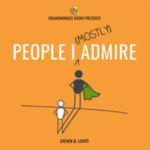I've often posted collections of quotes (see here). Tonight I was preparing for a lecture and I wanted to mention some of the all-time favorite short quotes. There are many website that offer such collections, including this one, where I obtained these short quotes that work well for me.
“Either you run the day, or the day runs you.”
– Jim Rohn
“Life shrinks or expands in proportion to one’s courage.”
– Anais Nin
“You must be the change you wish to see in the world.”
– Mahatma Gandhi
“Believe and act as if it were impossible to fail.”
– Charles Kettering
“The best way to predict the future is to invent it.”
– Alan Kay
“Change your thoughts and you change your world.”
– Norman Vincent
“If you want to lift yourself up, lift up someone else.
– Booker T. Washington
“You miss 100% of the shots you don’t take.”
– Wayne Gretzky
“The person who says it cannot be done should not interrupt the person who is doing it.”
– Chinese Proverb
“The only thing worse than being blind is having sight but no vision.”
– Helen Keller
“It is the mark of an educated mind to be able to entertain a thought without accepting it.”
– Aristotle
“The only true wisdom is knowing that you know nothing.”
– Socrates
“If you want to test your memory, try to recall what you were worrying about one year ago today.”
– E. Joseph Cossman
“Be a first rate version of yourself, not a second rate version of someone else.”
– Judy Garland
 Levitt (Co-Author of Freakonomics) interviewing Moncef Slaoui, the head of Operation Warp Speed (the U.S. COVID-19 vaccine program). Highly recommended. The show is called "People I Mostly Admire." This episode was released on Dec 11, 2020.
Levitt (Co-Author of Freakonomics) interviewing Moncef Slaoui, the head of Operation Warp Speed (the U.S. COVID-19 vaccine program). Highly recommended. The show is called "People I Mostly Admire." This episode was released on Dec 11, 2020. 
